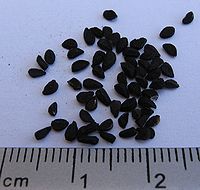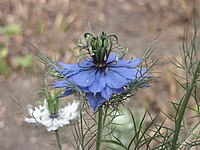നിഗെല്ല സറ്റൈവ
| നിഗെല്ല സറ്റൈവ | |
|---|---|

| |
| ശാസ്ത്രീയ വർഗ്ഗീകരണം | |
| കിങ്ഡം: | സസ്യലോകം |
| ക്ലാഡ്: | ട്രക്കിയോഫൈറ്റ് |
| ക്ലാഡ്: | സപുഷ്പി |
| ക്ലാഡ്: | യൂഡികോട്സ് |
| Order: | റാണുൺകുലേൽസ് |
| Family: | Ranunculaceae |
| Genus: | Nigella |
| Species: | N. sativa
|
| Binomial name | |
| Nigella sativa | |
| Synonyms[1] | |
| |
നിഗെല്ല സറ്റൈവ (ബ്ലാക്ക് കാരവേ, കരിഞ്ചീരകം, നിഗല്ല , ബ്ലാക്ക് കുമിൻ, കലോഞ്ജി, കാലാജീര എന്നും അറിയപ്പെടുന്നു) [2][3][4]റാണുൺകുലേസീ സസ്യകുടുംബത്തിലെ വാർഷിക സപുഷ്പികളിൽപ്പെടുന്ന ഒരു സസ്യമാണ്. കിഴക്കൻ മെഡിറ്ററേനിയൻ, ഉത്തരാഫ്രിക്ക, ഇന്ത്യൻ ഉപഭൂഖണ്ഡം, പശ്ചിമേഷ്യ എന്നിവിടങ്ങളിലെ സ്വദേശിയാണ്.
എൻ. സറ്റൈവ 20-30 സെന്റിമീറ്റർ (7.9-11.8 ഇഞ്ച്) വരെ ഉയരത്തിൽ ( ത്രെഡ്-പോലുള്ളവയല്ലാത്തവയായി) വളരുന്നു. പൂക്കൾ സാധാരണയായി അഞ്ചു മുതൽ പത്തു ദളങ്ങളോടു കൂടി ഇളം നീലയും വെളുപ്പും നിറത്തിലും കാണപ്പെടുന്നു.
ചരിത്രം[തിരുത്തുക]
എൻ. സാറ്റിവയുടെ ആദ്യകാല കൃഷിയെക്കുറിച്ചുള്ള പുരാവസ്തു തെളിവുകൾ മൂന്ന് സഹസ്രാബ്ദങ്ങൾ പഴക്കമുള്ളതാണ്. ടാറ്റൻഖാമുന്റെ ശവകുടീരം ഉൾപ്പെടെ പുരാതന ഈജിപ്തിൽ നിന്നുള്ള നിരവധി സൈറ്റുകളിൽ എൻ. സാറ്റിവ വിത്തുകൾ കണ്ടെത്തിയിട്ടുണ്ട്. [4][5] ബിസി രണ്ടാം മില്ലേനിയം മുതൽ തുർക്കിയിലെ ഹിത്യരുടെ തുകൽസഞ്ചിയിൽ വിത്തുകൾ കണ്ടെത്തിയിരുന്നു. [6]
എൻ. സറ്റിവ ആഹാരപദാർത്ഥങ്ങൾക്കു രുചി വർദ്ധിപ്പിക്കുന്നതിനായി പഴയ ലോകത്തിൽ ഒരു മസാലയായി ഉപയോഗിച്ചിരിക്കാം.[7][5]മുസ്ലീം പേർഷ്യൻ വൈദ്യനായ അവിസെന്ന തന്റെ കാനൻ ഓഫ് മെഡിസിനിൽ എൻ. സാറ്റിവയെ ഡിസ്പ്നിയയ്ക്കുള്ള ചികിത്സയായി നിർദ്ദേശിച്ചു. [8] എൻ. സറ്റിവ മിഡിൽ ഈസ്റ്റിൽ ഒരു പരമ്പരാഗത മരുന്നായി ഉപയോഗിച്ചിരുന്നു. [9]
പാചക ഉപയോഗങ്ങൾ[തിരുത്തുക]
അമേരിക്കൻ ഐക്യനാടുകളിൽ, ഫുഡ് ആൻഡ് ഡ്രഗ് അഡ്മിനിസ്ട്രേഷൻ നിഗെല്ല സറ്റിവ എൽ. (കറുത്ത ജീരകം, കറുത്ത കാരവേ) ഒരു സുഗന്ധവ്യഞ്ജനം, പ്രകൃതിദത്ത കറിക്കൂട്ട്, അല്ലെങ്കിൽ സുഗന്ധം എന്നിവയ്ക്കായി സാധാരണയായി സുരക്ഷിതമെന്ന് (ഗ്രാസ്) അംഗീകരിക്കപ്പെടുന്നു. [10] എൻ. സറ്റിവയുടെ വിത്തുകൾ പല വിഭവങ്ങളിലും സുഗന്ധവ്യഞ്ജനമായി ഉപയോഗിക്കുന്നു. [7] പലസ്തീനിൽ, വിത്തുകൾ കയ്പുള്ള ക്വിഷ പേസ്റ്റ് ഉണ്ടാക്കുന്നു. [11]
വിവരണം[തിരുത്തുക]
-
Nigella sativa
-
Seed
-
N. sativa seeds
-
The flowers can be blue or white
അവലംബങ്ങൾ[തിരുത്തുക]
- ↑ "The Plant List: A Working List of All Plant Species". Archived from the original on 2019-12-21. Retrieved 2018-06-29.
- ↑ നിഗെല്ല സറ്റൈവ in the Germplasm Resources Information Network (GRIN), US Department of Agriculture Agricultural Research Service. Accessed on 2017-12-11.
- ↑ Heiss, Andreas (December 2005). "The oldest evidence of Nigella damascena L. (Ranunculaceae) and its possible introduction to central Europe". Vegetation History and Archaeobotany. 14 (4): 562–570. CiteSeerX 10.1.1.156.85. doi:10.1007/s00334-005-0060-4. JSTOR 23419312. S2CID 18895456.
- ↑ 4.0 4.1 "Kalanji". Drugs.com. 2020-04-02. Retrieved 2020-05-01.
- ↑ 5.0 5.1 Zohary, Daniel; Hopf, Maria; Weiss, Ehud (2012). Domestication of Plants in the Old World: The Origin and Spread of Domesticated Plants in Southwest Asia, Europe, and the Mediterranean Basin (Fourth ed.). Oxford: University Press. p. 206. ISBN 9780199549061.
- ↑ Saliha B, Sipahib T, Oybak Dönmez, E (2009). "Ancient nigella seeds from Boyalı Höyük in north-central Turkey". Journal of Ethnopharmacology. 124 (3): 416–20. doi:10.1016/j.jep.2009.05.039. PMID 19505557.
{{cite journal}}: CS1 maint: multiple names: authors list (link) - ↑ 7.0 7.1 Engels, Gayle; Brinckmann, Josef (2017). "Nigella sativa". Herbalgram, American Botanical Council. Retrieved 2020-05-01.[പ്രവർത്തിക്കാത്ത കണ്ണി]
- ↑ Avicenna (1999). Canon of Medicine. Chicago: Kazi Publications.
- ↑ Hassanien, Minar M. M.; Abdel-Razek, Adel G.; Rudzińska, Magdalena; Siger, Aleksander; Ratusz, Katarzyna; Przybylski, Roman (15 July 2014). "Phytochemical contents and oxidative stability of oils from non-traditional sources". European Journal of Lipid Science and Technology (in ഇംഗ്ലീഷ്). 116 (11): 1563–1571. doi:10.1002/ejlt.201300475. ISSN 1438-7697.
- ↑ "Substances generally recognized as safe: Sec. 182.10. Spices and other natural seasonings and flavorings". US Food and Drug Administration, Code of Federal Regulations, 21CFR182.10. 2019-04-01. Retrieved 2020-05-17.
- ↑ Berger, Miriam (2019-03-28). "Is the world ready for this Palestinian dish?". BBC News - Travel (in ഇംഗ്ലീഷ്). Retrieved 2019-03-28.




